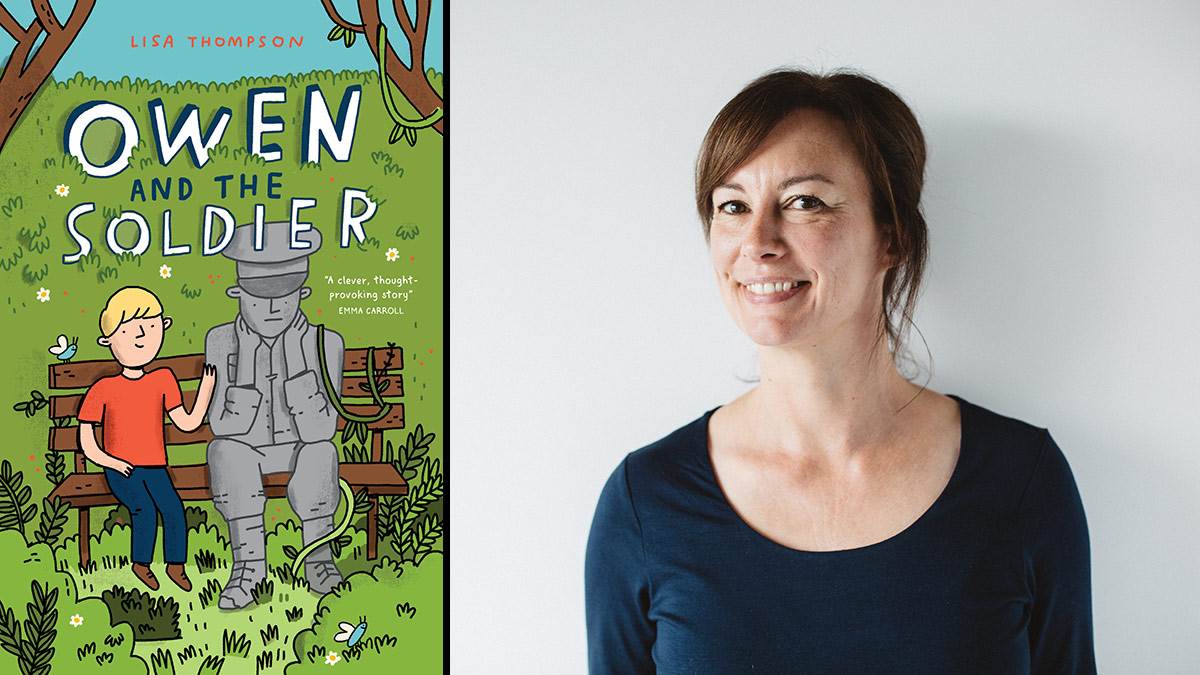'Stories enable us to remember': Lisa Thompson on the power of tales about war
Published on: 7 Tachwedd 2019
Lisa Thompson's book Owen and the Soldier is a touching tale of a lonely young boy who confides in a stone soldier in the park. The author tells us why war stories are still so important for children, and how reading can help us walk in other people's shoes...

Owen and the Soldier is shortlisted for the Blue Peter Book Awards 2020
How would you describe Owen and the Soldier in five words?
A thoughtful exploration of grief.
Can you tell us a bit about where the inspiration for the book came from?
I was on a train travelling home from an awards event in Cornwall. We pulled into a station and I looked up to see a sculpture of a man sitting on a bench. He had his head in his hands and looked quite distraught. It was incredibly moving. As the train pulled away, I thought of the idea of a boy who sits with a stone soldier on a bench in a memorial garden and talks to him.
Owen's mum is struggling at the start of the story and Owen picks up the pieces around the house. Lots of children across the UK are young carers for sick or unwell parents but it's not something you see a lot in books. Was this something you really wanted to explore?
I think there is always a moment in your childhood when you realise that your parents aren't invincible. A moment when you see your parent cry, or they appear especially vulnerable. Owen's mum is at an incredibly low point in her life and I wanted to explore how that would feel from a young person's point of view.
War, both past and present, has a big presence in Owen and the Soldier. What do you think children reading today need from stories about conflicts like these?
Stories enable us to remember. It's important that what has happened in the past (and what is still happening) is still brought to children through all mediums: poetry, books, art, film. It gives us all another way to remember. And when a story is told from the point of view of a child who is actually experiencing the effects of a war, then the reader can really begin to understand the impact.
What appeals to you about reading or writing short stories and novellas?
I find short stories incredibly satisfying to read and write. Road Dahl's short story collections made a huge impact on me... So huge that I wrote my own collection of "twisted" stories just before I embarked on a novel! My first book, The Goldfish Boy, grew from a short story – I love reading them, I love writing them. It's a win-win! I also know there are many, many children who like reading short books! I was definitely one of them as a child.
Owen is convinced to take part in a poetry presentation during the story. Are you big fan of poetry, either reading or writing? What is your favourite poem?
I still have one of the first poems I wrote when I was around seven. It starts:
There was a young girl called Fay Doodle,
Who had a gigantic poodle.
I am incredibly proud of that poem and my teacher put it on the classroom wall! I think I only started appreciating reading poetry when I was studying for my English Literature A Level. I loved analysing them and dissecting why they chose particular words or rhythms.
I find writing poetry incredibly hard and I admire anyone who can do it! One of my favourite poems is more famous as a Christmas carol, 'In the Bleak Midwinter' by Christina Rossetti. Those first two lines are so evocative of a freezing cold winter day that it makes you physically shiver.
Your writing is great at exploring different views of the world. How important is this in books for children?
I think fiction is an incredible vehicle for teaching empathy in all of us. I know myself that I can begin reading a book with an almost fully-formed opinion on the main character, but as I travel with them across those pages I can really feel how it might be to walk in that person's shoes. All of my books are written in the first person, too, and I think that really helps a reader to get into someone's skin.
Who or what made you into a reader? Can you remember a specific book or moment?
There were two significant moments. One was crying reading Charlotte's Web when I was nine – it had a huge impact. I couldn't believe that just words on pieces of paper could have the power to make me cry. I thought that was phenomenal.
The second moment was when I was in my early teens and I saw Road Dahl's stories, The Tales of the Unexpected, on TV. Those short, twisted tales really made me want to be a writer. I wanted to give a reader goosebumps, too.
Find out more about the Blue Peter Book Awards 2020
This article was originally published, in a slightly different version, in June 2019.
Topics: Blue Peter Book Awards, War, Features





Add a comment